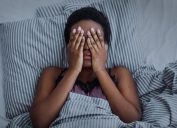10 Genius Tricks for Falling Back Asleep in the Middle of the Night
Don't waste another second staring at the ceiling.
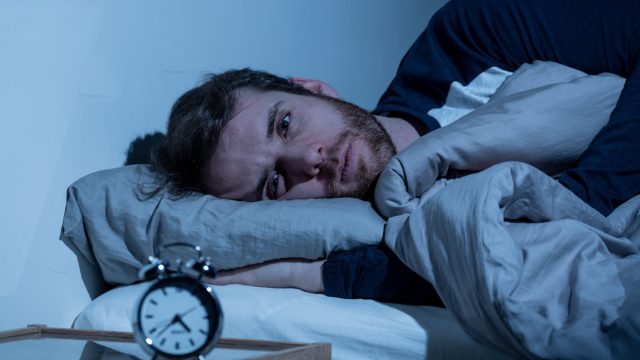
Waking up in the wee hours of the night is the worst—and we've all been there. Best case, you'll start your day a little bit groggier, a little bit crankier, and a whole lot hungrier. (The European Journal of Clinical Nutrition found that folks who don't get enough sleep consume nearly 400 more calories than normal the following day.) And while it may be tempting to reach for the sleep-aid tablets in such situations, you should know that there are other, science-backed ways to fall asleep—naturally.
In fact, the one thing you don't want to do is turn to medications. According to the Mayo Clinic, frequent use of over-the-counter sleep aids could create a dependency that, over time, will only exacerbate your insomnia. So before you pick up a bottle of melatonin, try out one of these tricks instead.
Read on for 10 tricks that may help you fall back to sleep so quickly that any unwelcome moments of wakefulness will seem like they were nothing more than a fleeting dream.
READ THIS NEXT: I'm a Pharmacist, and This Is the Sleep Aid I Recommend.
1
Sniff some lavender
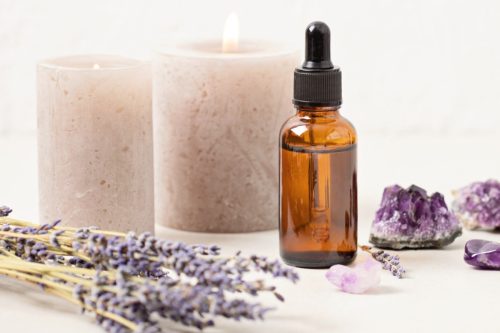
Everyone loves the smell of lavender. But it turns out the stuff has some serious benefits, too.
Per a study in The Journal of Biological and Medical Rhythm Research, lavender can help lull you into an increased state of relaxation. Better yet, according to the researchers, just three whiffs of the stuff—over up to a 30-minute period—can help you sleep deeper and feel more energized upon waking up. Keep a stock in your bedside drawer to lull you off to dreamland whenever necessary.
2
Turn down the heat
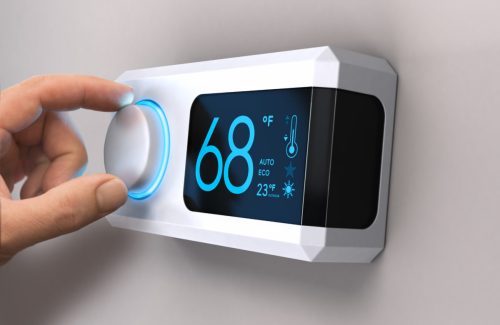
The ideal temperature for your bedroom should be between 60 and 67 degrees Fahrenheit, according to research out of Harvard Medical School. Their experts say that when your body starts power down for the night, it drops a few degrees, which subsequently helps your body enter and stay in REM.
By keeping your room toasty, no matter how cozy it might feel during frigid winter nights, you're just inhibiting your own sleep.
READ THIS NEXT: If You Sleep in This Position, You Could Be Hurting Your Spine, Experts Warn.
3
Hop in the shower

You know that feeling when you step out of the shower and you feel a shiver? That's the feeling of your body temperature dropping a few degrees—which, again, helps your fall back asleep.
Next time you're awake in the wee hours, try turning down the temperature in your room, taking a quick, warm shower, and heading back to bed. By the time your head hits the pillow, your room will have cooled down, helping you fall right back asleep.
4
Put on some socks
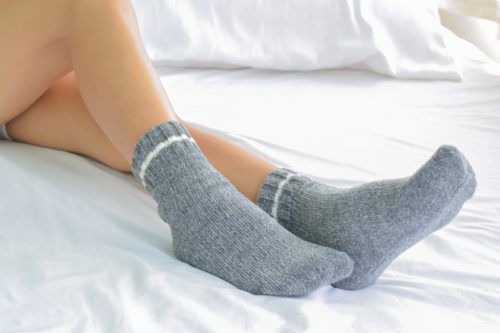
According to a study in Nature, "the degree of dilation of blood vessels in the skin of the hands and feet … is the best physiological predictor for the rapid onset of sleep."
In other words, folks who wear socks fall asleep faster. So if you need to nod off quickly after unexpectedly waking up, slip on a pair of socks.
5
Don't look at the clock
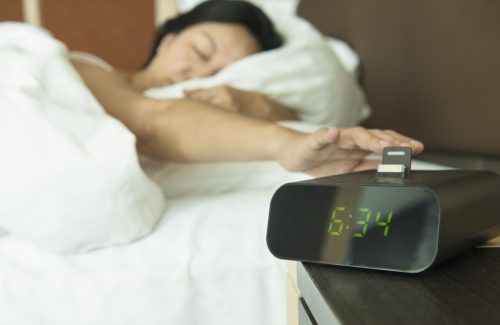
When you wake up in the middle of the night, it's tempting to peek at the time. But according to the Mayo Clinic, looking at the clock can cause undue distress—and that can prevent you from getting back to sleep. So make sure any indications of the time—an alarm clock, your phone—are out of sight.
6
Power off your devices
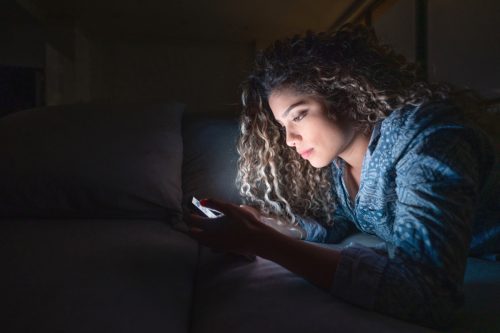
The soft light that comes from electronic devices—blue light—is your worst enemy when it comes to getting a good night's rest. Blue light is what experts call "short-wavelength-enriched," meaning it suppresses your melatonin receptors. Melatonin, if you didn't know, is the hormone that helps you sleep.
So do some cleanup before you go to bed. Turn off your TV. Close your laptop. Put your phone facedown. That way, these devices won't wake you up again in the middle of the night.
For more health news sent directly to your inbox, sign up for our daily newsletter.
7
Blow bubbles

Yes, like a child would. Rachel Marie E. Salas, MD, a professor of neurology at Johns Hopkins University, told the New York Post, blowing bubbles serves as a breathing exercise, which calms your body and mind—and a calm body and mind will help lull you back to dreamland.
8
Try the 4-7-8 method

When all else fails, try Andrew Weil, MD's method: The 4-7-8. Here's how: Place the tip of your tongue against the tissue behind your top front teeth. Exhale through your mouth, completely, and make a whoosh noise. Close your mouth. Inhale through your nose for four seconds. Hold your breath for seven seconds. Exhale through your mouth again—yes, you still have to whoosh. Repeat the whole thing three or four times.
9
Get frisky

If you're sharing a bed with a partner, consider snuggling up and getting close—very close. "Sexual activity can often contribute to better sleep," the experts at Sleep Foundation write. "After an orgasm, the body releases hormones like oxytocin and prolactin, that can induce pleasant and relaxing feelings." They also note that sex reduces levels of the stress hormone, cortisol, which may also help you drift back off to sleep.
10
Cut your losses
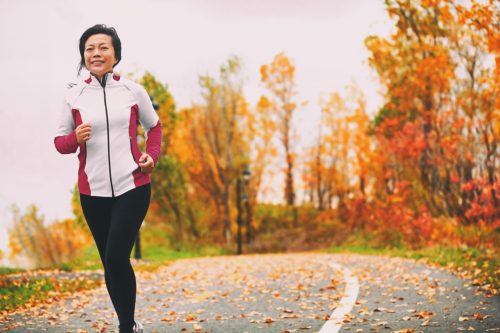
At a certain point—say, an hour or two before you're planning on waking up anyway—it's best to just forgo sleep altogether. Use that time for an activity you might not usually have time for. Whip up an energizing breakfast, clean the bathroom, or go for a morning run.
Best Life offers the most up-to-date information from top experts, new research, and health agencies, but our content is not meant to be a substitute for professional guidance. When it comes to the medication you're taking or any other health questions you have, always consult your healthcare provider directly.

